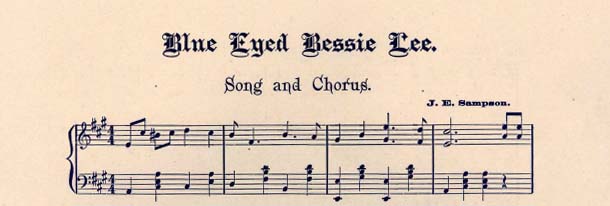
Historic Sheet Music Collection
Document Type
Score
Links to Recordings at the Internet Archive
https://archive.org/details/78_marching-through-georgia_harlan-and-stanley-henry-clay-work_gbia0017645a
Publication Date
1865
Lyrics
[Verse 1]
Bring the good old bugle, boys! We’ll sing another song
Sing it with a spirit that will start the world along
Sing it as we used to sing it, fifty thousand strong, While we were marching through Georgia.
[Chorus]
“Hurrah! Hurrah! We bring the Jubilee!
Hurrah! Hurah! The flag that makes you free!”
So we sang the chorus from Atlanta to the sea,
While we were marching through Georgia.
[Verse 2]
How the darkeys shouted when they heard the joyful soung!
How the turkeys gobbled which our commissary found! How the sweet potatoes even started from the ground, While we were marching through Georgia.
[Chorus]
[Verse 3]
Yes, and there were union men who wept with joyful tears,
When they saw the honor’d flag they had not seen for years;
Hardly could they be restrained from breaking forth in cheers,
While we were marching through Georgia.
[Chorus]
[Verse 4]
“Sherman’s dashing Yankee boys will never reach the coast!”
So the saucy rebels said, and ‘twas a handsome boast,
Had they not forgot, alas! To reckon with the host, While we were marching through Georgia.
[Chorus]
[Verse 5]
So we made a thoroughfare for Freedom and her train, Sixty miles in latitude three hundred to the main; Treason fied before us, for resistance was in vain, While we were marching through Georgia.
[Chorus]
Recommended Citation
Work, Henry Clay, "Marching Through Georgia" (1865). Historic Sheet Music Collection. 898.
https://digitalcommons.conncoll.edu/sheetmusic/898
The views expressed in this paper are solely those of the author.
Comments
Marching Through Georgia
In Honor of Maj. Gen. Sherman’s Famous March “from Atlanta to the Sea”
Words and Music by Henry Clay Work
Chicago: Root & Cady (1865)
Some of these resources may contain offensive language or negative stereotypes. Such materials should be seen in the context of the time period and as a reflection of attitudes of the time. The items are part of the historical record, and do not represent the views of the library or the institution.